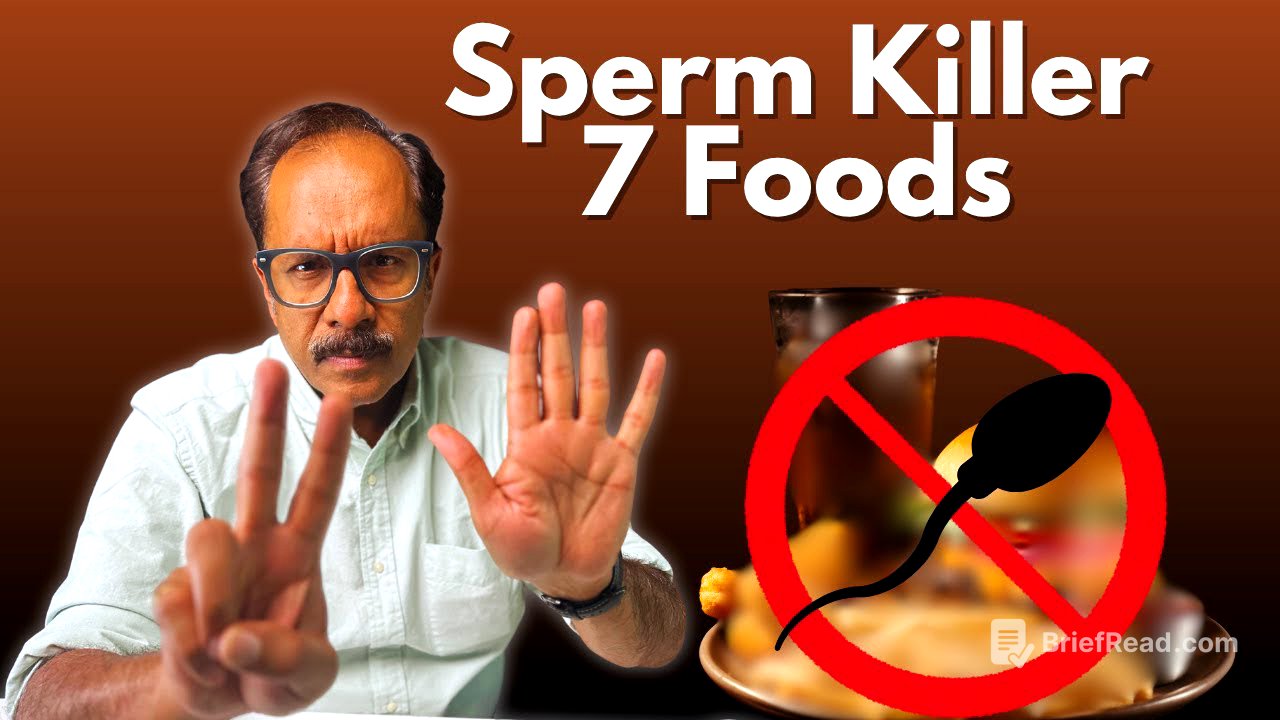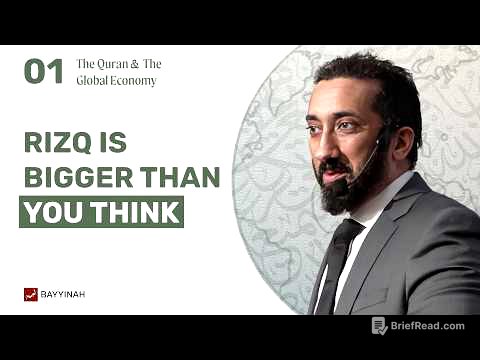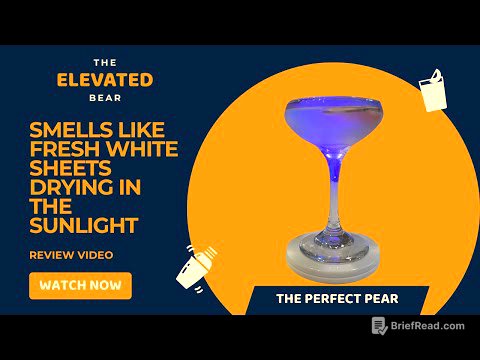TLDR;
Dr. Sunil Jindal discusses seven types of food that can negatively impact sperm health and fertility, along with a bonus tip to improve sperm quality. These include processed meats, soy products, full-fat dairy, sugary beverages and junk food, alcohol, pesticide-laden fruits and vegetables, and trans fats. He advises incorporating antioxidant-rich foods and offers a course with lifestyle, food, and supplement guidance to enhance fertility.
- Processed meats, high in saturated fats, nitrates, and preservatives, can lower sperm count.
- Soy products contain phytoestrogens that mimic female hormones, disrupting hormonal balance and reducing sperm production.
- Full-fat dairy contains estrogenic hormones and pesticides, affecting sperm motility and morphology.
- Sugary beverages and junk food trigger insulin resistance, obesity, and oxidative stress, harming sperm health.
- Alcohol consumption lowers testosterone, reduces testicular volume, and damages sperm DNA.
- Non-organic fruits and vegetables contain pesticides that disrupt endocrine function and lower sperm count.
- Trans fats, found in fast food and processed snacks, cause oxidative stress and reduce sperm concentration.
- Antioxidant-rich foods like walnuts, berries, and spinach can protect sperm from oxidative stress and improve motility.
INTRODUCTION [0:00]
Dr. Sunil Jindal introduces the topic of foods that can harm sperm and fertility. He emphasizes the importance of knowing about these foods, regardless of age or desire for children. He promises to reveal seven sperm-killing foods, with the fourth being the most dangerous, and will conclude with a bonus fertility hack to improve sperm health.
Processed Meats [1:10]
Processed meats like bacon, sausage, and salami are detrimental to sperm health due to their high content of saturated fats, nitrates, and preservatives. These components increase oxidative stress, which negatively impacts sperm. A Harvard study from 2014 indicated that men who consume processed meats have a 23% lower sperm count compared to those who abstain. Dr. Jindal recommends replacing processed meats with chicken, fish, and plant-based proteins to improve sperm health.
Soy Products [2:06]
Soy products contain phytoestrogens, which mimic female hormones and can disrupt hormonal balance, leading to reduced sperm production. A 2008 study in Human Reproduction found that men with high soy consumption had lower sperm concentration. Dr. Jindal advises reducing soy milk intake, avoiding soy-based protein powders, and limiting tofu consumption, especially for men trying to conceive.
Full-Fat Dairy [3:00]
Full-fat dairy products, including buffalo and cow milk, cheese, and paneer, contain estrogenic hormones from pregnant cows and pesticides stored in fat. A 2013 study from Fertility Story revealed that men who consumed full-fat dairy had lower sperm motility and morphology. Dr. Jindal suggests switching to low-fat or almond milk and consuming dairy products in moderation.
Sugary Beverages & Junk Food [4:07]
Sodas, sugary drinks, energy drinks, and fried junk food can harm sperm health by triggering insulin resistance, increasing obesity, and raising oxidative stress. A 2010 Danish study by I. Jasnetal found that men who drank one liter of soda per day had a 30% lower sperm count than non-drinkers. Dr. Jindal urges viewers to eliminate these items from their diet to protect their sperm.
Alcohol [5:11]
Alcohol consumption, especially chronic or heavy drinking, can negatively impact sperm health by increasing estrogen levels, damaging the liver, and producing acetaldehyde, which is toxic to sperm DNA. The World Health Organization has found that chronic alcoholism lowers testosterone and reduces testicular volume. Dr. Jindal recommends moderation, suggesting no more than one or two drinks per week, or complete abstinence for those with low sperm count or actively trying to conceive.
Pesticide-Loaded Fruits & Vegetables [6:03]
Fruits and vegetables containing pesticides can be toxic to sperm due to their endocrine-disrupting properties. A 2015 Harvard study showed that men who ate foods with the highest levels of pesticides had a 49% lower sperm count. Dr. Jindal advises buying organic produce when possible and thoroughly washing all fruits and vegetables to remove pesticide residue.
Trans Fats [7:04]
Trans fats, commonly found in fast food, processed snacks, and baked goods, can cause oxidative stress and inflammation, damaging sperm. A 2011 study in Human Reproduction indicated that higher trans fat intake is associated with lower sperm concentration and testicular volume. Dr. Jindal recommends avoiding packaged and fast foods, and instead opting for nuts or omega-3-rich foods like walnuts and seeds.
Bonus tip [8:36]
Dr. Jindal shares a bonus tip: incorporating antioxidant-rich foods into the diet. Foods like walnuts, berries, spinach, and omega-3 fatty acids protect sperm from oxidative stress. A 2019 study in the journal Cognitive Behavioral Therapy confirmed that antioxidants improve sperm motility and pregnancy rates. He also mentions a comprehensive course he created, covering lifestyle, food, and supplements, to naturally enhance fertility.









